物称和人称
- 格式:ppt
- 大小:277.00 KB
- 文档页数:35
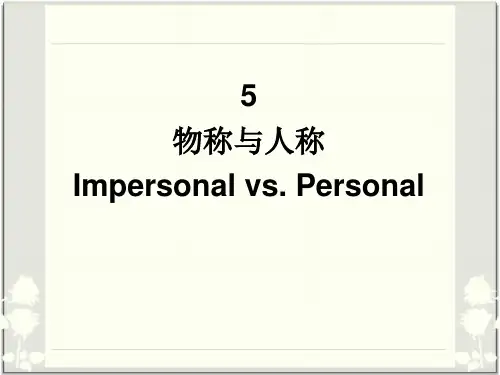

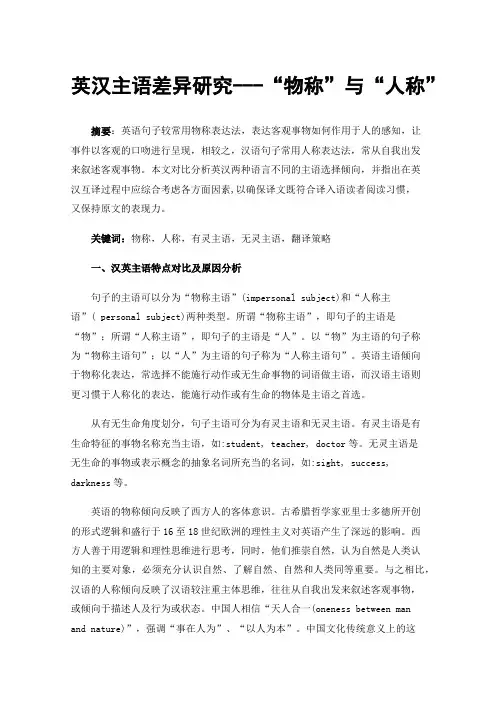
英汉主语差异研究---“物称”与“人称”摘要:英语句子较常用物称表达法,表达客观事物如何作用于人的感知,让事件以客观的口吻进行呈现,相较之,汉语句子常用人称表达法,常从自我出发来叙述客观事物。
本文对比分析英汉两种语言不同的主语选择倾向,并指出在英汉互译过程中应综合考虑各方面因素,以确保译文既符合译入语读者阅读习惯,又保持原文的表现力。
关键词:物称,人称,有灵主语,无灵主语,翻译策略一、汉英主语特点对比及原因分析句子的主语可以分为“物称主语”(impersonal subject)和“人称主语”( personal subject)两种类型。
所谓“物称主语”,即句子的主语是“物”;所谓“人称主语”,即句子的主语是“人”。
以“物”为主语的句子称为“物称主语句”;以“人”为主语的句子称为“人称主语句”。
英语主语倾向于物称化表达,常选择不能施行动作或无生命事物的词语做主语,而汉语主语则更习惯于人称化的表达,能施行动作或有生命的物体是主语之首选。
从有无生命角度划分,句子主语可分为有灵主语和无灵主语。
有灵主语是有生命特征的事物名称充当主语,如:student, teacher, doctor等。
无灵主语是无生命的事物或表示概念的抽象名词所充当的名词,如:sight, success,darkness等。
英语的物称倾向反映了西方人的客体意识。
古希腊哲学家亚里士多德所开创的形式逻辑和盛行于16至18世纪欧洲的理性主义对英语产生了深远的影响。
西方人善于用逻辑和理性思维进行思考,同时,他们推崇自然,认为自然是人类认知的主要对象,必须充分认识自然、了解自然、自然和人类同等重要。
与之相比,汉语的人称倾向反映了汉语较注重主体思维,往往从自我出发来叙述客观事物,或倾向于描述人及行为或状态。
中国人相信“天人合一(oneness between manand nature)”,强调“事在人为”、“以人为本”。
中国文化传统意义上的这种人本文化的长期积淀,形成了汉民族主体型的思维方式,即以人文为中心来观察、分析、推理和研究事物的思维。
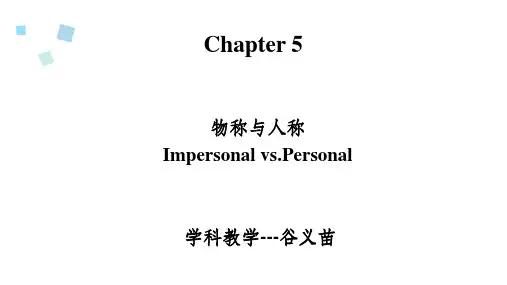

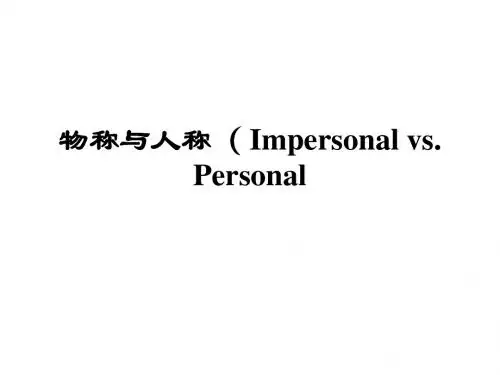



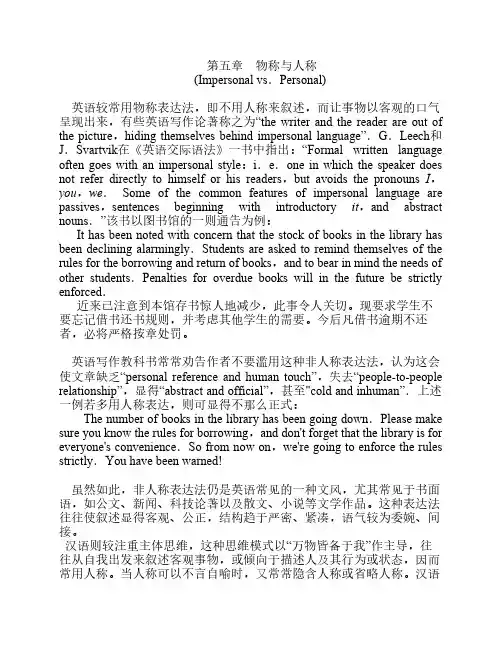
第五章物称与人称(Impersonal vs.Personal)英语较常用物称表达法,即不用人称来叙述,而让事物以客观的口气呈现出来,有些英语写作论著称之为“the writer and the reader are out of the picture,hiding themselves behind impersonal language”.G.Leech和J.Svartvik在《英语交际语法》一书中指出:“Formal written language often goes with an impersonal style:i.e.one in which the speaker does not refer directly to himself or his readers,but avoids the pronouns I,you,we.Some of the common features of impersonal language are passives,sentences beginning with introductory it,and abstract nouns.”该书以图书馆的一则通告为例:It has been noted with concern that the stock of books in the library has been declining alarmingly.Students are asked to remind themselves of the rules for the borrowing and return of books,and to bear in mind the needs of other students.Penalties for overdue books will in the future be strictly enforced.近来已注意到本馆存书惊人地减少,此事令人关切。

第五章物称与人称(Impersonal vs.Personal)英语较常用物称表达法,即不用人称来叙述,而让事物以客观的口气呈现出来,有些英语写作论著称之为“the writer and the reader are out of the picture,hiding themselves behind impersonal language”.G.Leech和J.Svartvik在《英语交际语法》一书中指出:“Formal written language often goes with an impersonal style:i.e.one in which the speaker does not refer directly to himself or his readers,but avoids the pronouns I,you,we.Some of the common features of impersonal language are passives,sentences beginning with introductory it,and abstract nouns.”该书以图书馆的一则通告为例:It has been noted with concern that the stock of books in the library has been declining alarmingly.Students are asked to remind themselves of the rules for the borrowing and return of books,and to bear in mind the needs of other students.Penalties for overdue books will in the future be strictly enforced.近来已注意到本馆存书惊人地减少,此事令人关切。